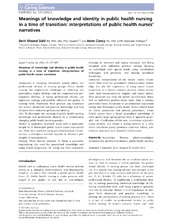Meanings of knowledge and identity in public health nursing in a time of transition: interpretations of public health nurses’ narratives
Peer reviewed, Journal article
Published version

Åpne
Permanent lenke
https://hdl.handle.net/1956/11980Utgivelsesdato
2015-12Metadata
Vis full innførselSamlinger
Originalversjon
https://doi.org/10.1111/scs.12196Sammendrag
Background: A changing healthcare system affects the professional identity of nursing groups. Public health nursing has experienced challenges in balancing the paternalistic expert ideology and the empowerment participation ideology. A strong professional identity can legitimate nursing, and possibly influence the quality of nursing work. Narrations from practice can illuminate the nurses’ theoretical and practical knowledge and help illustrate their collective professional identity. Aim: To illuminate the meaning of public health nursing knowledge and professional identity in a continuously changing public health nursing practice. Method: A qualitative interview study with a purposeful sample of 23 Norwegian public health nurses was carried out. Data were analysed using phenomenological hermeneutics, a descriptive method inspired by Ricoeur's philosophy of interpretation. Findings: Three themes emerged (i) Being a generalist: emphasising the need for generalised knowledge and using clinical judgement, (ii) Being one who empowers: focusing on resources and coping strategies, (iii) Being occupied with individual problem solving: focusing on individuals with special needs, using standardised techniques and protocols, and lacking specialised knowledge. Conclusion: Interpretation of the nurses' stories illuminated their need for generalised evidence-based knowledge, but also the importance of using sound clinical judgement in a diverse complex practice, where service users need encouragement, support and expert advice. Time pressures can limit the nurses' involvement. Many had an individual problem-focus more than a primary prevention focus, in contrast to governmental regulations stating that Norwegian public health nurses should focus on health promotion and primary prevention. Public health nurses have a broad generalised knowledge of their special target group giving them a ‘specialist generalist’ role. Clarification of this role, in relation to jurisdictional borders, can create a strong identity at a time when healthcare policy promotes economic values, professional neutrality and increased collaboration.
Utgiver
WileyTidsskrift
Scandinavian Journal of Caring SciencesOpphavsrett
Copyright 2015 The Authors.
Med mindre annet er angitt, så er denne innførselen lisensiert som This is an open access article under the terms of the Creative Commons Attribution-NonCommercial-NoDerivs License, which permits use and distribution in any medium, provided the original work is properly cited, the use is non-commercial and no modifications or adaptations are made.
